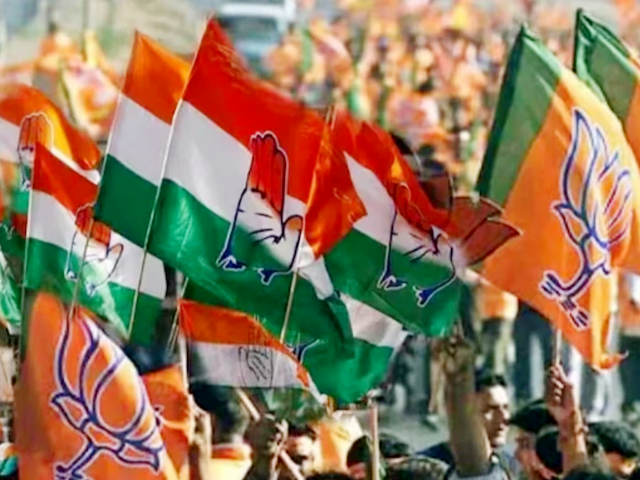
A common refrain among those labelled 'defectors', 'deserters', 'rebels', or 'turncoats' is that they're just seeking a better deal. Such instances of party-hopping tend to make headlines, especially during election season. Even before the official commencement of the Lok Sabha elections in 2024, a series of party crossovers had already begun. Earlier this month, Arvinder Singh Lovely, who had recently resigned from his position as the Delhi president of the Congress, swiftly joined the Bharatiya Janata Party (BJP). Interestingly, this marked his second stint with the Bharatiya Janata Party (BJP), having previously left the party to rejoin the Congress in 2018.
Lovely cited his disagreement with the Congress's decision to have an electoral alliance with the Aam Aadmi Party (AAP) in Delhi, expressing discontent with the inclusion of 'outsider' candidates fielded by the Congress in the capital. Notably, the Congress candidate list includes former BJP MP Udit Raj and former Jawaharlal Nehru University (JNU) student leader Kanhaiya Kumar. It's worth mentioning that Lovely had previously contested against the BJP's Gautam Gambhir in 2019, losing by over 3.9 lakh votes in the East Delhi constituency.
An Extensive List
Meanwhile, over 1,500 km away in Barrackpore, located in North 24 Parganas district of West Bengal, Arjun Singh finds himself contesting on a BJP ticket after being denied nomination by the state's ruling Trinamool Congress (TMC). Five years ago, he had switched allegiance to the BJP from the TMC to secure victory in the 2019 polls, only to return three years later.
Read | Opinion: Fluid Friendships - Over A Quarter Of BJP Candidates Are Defectors
Further west, over 1,900 km from Barrackpore, Milind Deora, former Lok Sabha MP from the Congress, now serves as a Rajya Sabha MP representing the Shiv Sena. He is actively campaigning for Prime Minister Narendra Modi and his current party leader, Maharashtra Chief Minister Eknath Shinde. Deora had previously held the Mumbai South seat for the Congress for two consecutive terms (2004 and 2009). In the 2014 elections, Arvind Sawant of the Shiv Sena, now aligned with the Uddhav Thackeray faction, won the seat and retained it in 2019. Notably, Milind's father, Murli Deora (Congress), previously won the seat in 1984, 1989, 1991, and 1998.
The aforementioned individuals (Lovely, Raj, Kumar, Singh, Deora, and Sawant) are just a few examples from the extensive list of party-hoppers in 2024. However, this is not a phenomenon exclusive to the present day. Even independent legislators and leaders of regional parties have frequently changed allegiances. Figures like Ajit Singh and Ram Vilas Paswan were adept at predicting election outcomes and often found themselves joining hands with the winning side.
Attempts To Curb Defections
Looking back, between March 1967 and February 1968, the country witnessed a series of party allegiance changes among legislators in various states. The Y.B. Chavan Committee (1969) was established to address the issue of defections. Out of approximately 542 instances of party-hopping that occurred over a two-decade period between the first and fourth general elections (1951, 1957, 1962, and 1967), at least 438 defections were recorded within a 12-month period. Among independent candidates, 157 out of 376 elected representatives joined various parties during this period.
It was evident that the allure of holding office played a significant role in legislators' decisions to defect, with 116 out of 210 defecting leaders subsequently included in the Councils of Ministers they helped form through defections.
Read | Anti-Defection Law Doesn't Apply: 6 'Rebel' Congress MLAs To Himachal Speaker
Subsequently, the Constitution (Thirty-second Amendment) Bill of 1973 was introduced in the Lok Sabha on May 16, 1973, to provide for disqualification on defections. It was referred to a Joint Committee of the Houses of Parliament, which became defunct with the dissolution of the Fifth Lok Sabha on January 18, 1977.
Another attempt was made with the introduction of the Constitution (Forty-eighth Amendment) Bill of 1979 in the Lok Sabha. However, it was withdrawn due to opposition from several members from both the ruling and opposition benches.
It was after the 1984 general elections that the Constitution (Fifty-second Amendment) Bill was introduced in the Lok Sabha. The anti-defection law was enacted in January 1985 to curb defections that sometimes threatened the foundations of democracy.
Although the law has achieved moderate success, it has not been able to fully address all its loopholes.
There is an adage - "Aya Ram, Gaya Ram" (he comes, he goes) - that reflects the journey of such legislators. In Haryana, the media described Bhajan Lal as the "master of horse-trading" and noted his "superhuman powers of persuasion" for his ability to forge alliances across party lines. Some legislators from the state, such as Hira Nand Arya and Gaya Lal, are still remembered for their political somersaults. The political history of India since the 1950s is replete with such incidents.
Not India-Exclusive
Such political manoeuvring is not limited to India. In the United Kingdom, Ramsay Macdonald once led a minority Labour government and later a National Government dominated by the Conservative Party. There are also reports of defections from the Australian Parliament. In the US, Congressmen often vote against their party's programme on important issues without formally defecting.
In India, various committees have examined the anti-defection law and several recommendations have been made, but suitable amendments have yet to be enacted to fully develop the existing legislation. While the problem has been identified and addressed to some extent, it is imperative for lawmakers to follow the law in letter and spirit.
(Jayanta Bhattacharya is a senior journalist writing on polls and politics, conflict, farmer and human interest issues)
Disclaimer: These are the personal opinions of the author


